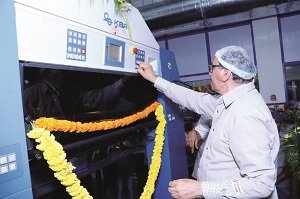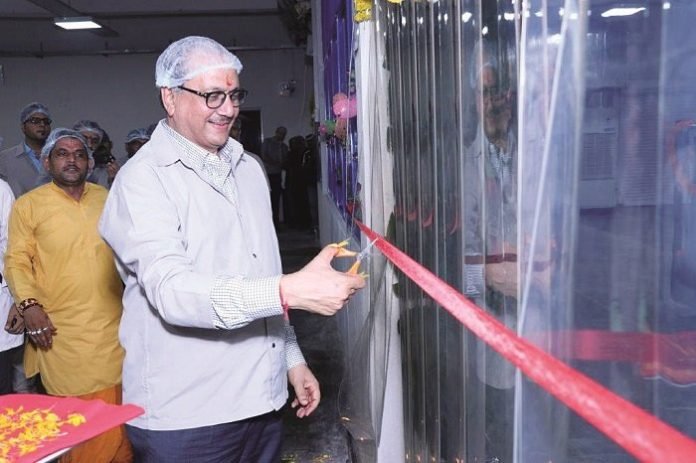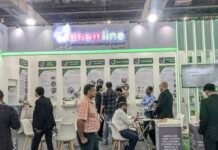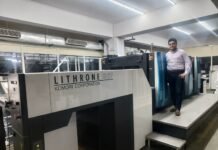Staying true to its approach of adding new technology every few years, Mumbai-headquartered paper-based packaging solutions provider Parksons Packaging commissioned a brand new KBA Rapida 106 press at its Daman plant on 11 July 2018. The press was inaugurated by Ramesh Kejriwal, chairman of Parksons Packaging. This is the third KBA press installed at the Daman plant.
“The KBA press that we have just inaugurated at our Daman plant is a modern machine and is a replacement for an older press which was almost ten years old. With this new press we will be able to get much higher productivity and better control over quality. We expect the productivity of the new press to be about 50-60% higher than the older press that we have replaced,” Kejriwal told Packaging South Asia.
The new KBA Rapida 106 7-color plus coater press at the Daman plant is a highly configured press with two unique features: simultaneous plate changing (SPC) and Qualitronic ColorControl (QCC) system with a camera for online color density and LAB value corrections. The press boasts of a 740 x 1060 mm format size and has a maximum speed of 18,000 sheets an hour with the capability to print with both conventional as well as UV inks. “This is the first KBA press in India with this configuration,” Kejriwal shared.
Getting another KBA Rapid 106 at Daman made a lot of operational sense for Parksons. “We already had two KBA presses of the same size at Daman. Adding a third made a lot of sense as it gave us the flexibility to seamlessly switch jobs among the presses,” said Kejriwal.
Branded packaging segment on the way up
After a gap of almost a year, growth is again visible in the food and beverages sectors with India’s leading consumer product firms declaring better than expected results this quarter. The second half of financial year 2016-2017 and nearly all of financial year 2017-2018 was muted for the consumer sector mainly due to demonetization and then the advent of the GST regime. Since Parksons is catering to top tier brands in the food and beverage sector, or what the company calls the branded packaging sector, the impact was not that serious. Nevertheless, there was definitely a squeeze on the margins.
“Our profits were definitely affected due to the two factors but not very seriously. However, since May this year we have seen a good pick-up in demand. My assessment is that financial year 2018-2019 will definitely be better for the sector compared to 2017-2018. However, growth will be fully back on track in the financial year 2019-2020,” Kejriwal explained.
Premiumization that was taking place in the consumer space had slowed down during the last couple of years due to sluggish demand. That process too is expected to gather pace as demand picks up, Kejriwal opined.
Paper prices are a challenge
Although the outlook for the paper-based packaging sector is positive due to rising disposable incomes, growth in modern retail and expansion in the reach of eCommerce, certain challenges remain in the near term. The most important one is the rising price of paper. According to Kejriwal, this situation may not improve any time soon.
“The cost of paper manufacturing has gone up due to higher pulp prices. Another factor is that Indian paper mills are diverting their product towards the export market where they are getting higher prices. Shutting down of paper mills in China has impacted the supply of paper in the global market. I do not see any relief when it comes to paper price at least until the end of this year,” he said.

KBA press into operation
Plastic ban to positively impact paper-based packaging
With sustainability and environmentally friendly packaging becoming a buzz word and multiple states moving towards banning single use plastic packaging solutions, the focus has shifted towards alternatives such as paper. Kejriwal believes that the ban on single use plastic packaging solutions such as carry bags will provide a boost to paper-based solutions. Does he see banning plastic as a solution to tackle waste?
“I am not competent enough to comment on whether imposing a ban is the correct way to address the problem of plastic packaging waste or not. What I can say is that globally consumers are becoming sensitive about the environment and some forms of plastic packaging like single use bags will definitely be phased out. Having said that, I want to stress that you cannot completely get rid of plastics. It is not the use of plastic that is the issue but its collection and recycling, especially in India. That is where the real problem lies. To address this, all stakeholders will need to come together,” Kejriwal said.
Further investment at Parksons Packaging
Parksons currently operates six plants across all the regions of India. The Daman plant, which is the company’s oldest, is more or less saturated and there is little scope for any major expansion there. The other five plants, one at Chakan near Pune which is also in Western India, two in Pantnagar in North India, one at Sricity in South India and the latest to come on line at Guwahati in the North-East have room for further investments. In the current financial year, the Sricity plant will see the addition of another packaging press soon while the Guwahati plant will see some capacity addition. According to Kejriwal, the Pantnagar plants may see some machine replacement in keeping with the company’s practice of maintaining a very high level of performance and productivity.
“As you know Guwahati and Sricity are two of our newest plants and in 2017-2018 these two plants were the major drivers for growth in the company’s top line. These two plants have significant scope of expansion,” he said.
Asked if the company at present has achieved a wide enough footprint across the country to reach its customers easily, Kejriwal answered in the affirmative. “With the six plants that we operate, we are within 400 kilometer radius of all our customers, which is pretty good. So, at the moment we feel our spread across the country is up to the mark.”
Automation in packaging
Automation in manufacturing is now gaining traction, especially in developed economies. Industry 4.0 is something which is a hot topic at industry conferences. According to Kejriwal, automation in the packaging sector must be understood from the point of view of return on investment. “In India you cannot automate just for the sake of it. You have to see if you are deriving any benefits out of the process.”
From the packaging sector’s point of view, automation can be seen in two ways. First, automation which leads to better quality and efficiency and second level, that takes the manufacturing process to the next level by utilizing robots and artificial intelligence.
“Automation of the first kind is happening in the Indian packaging industry. Parksons is a great example of that. However, automation of the second variety is something which is sometime away. It is just not feasible to have that kind of technology in the Indian packaging sector at this moment,” he concluded.











